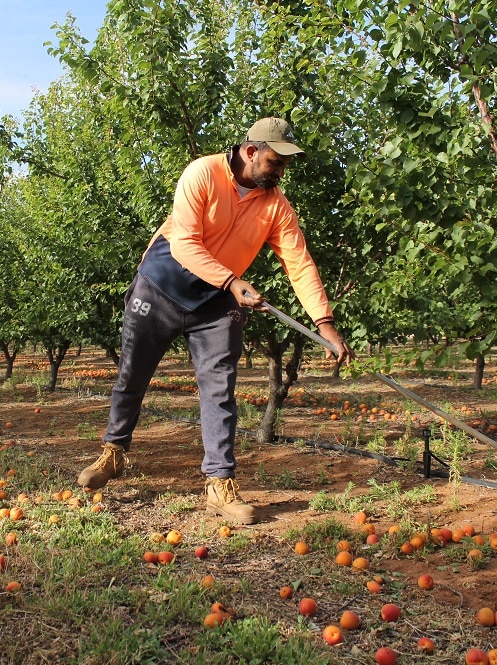There’s been a mixed reaction among fruit pickers and growers in South Australia’s Riverland following a ruling from the Fair Work Commission that workers on a piece rate must be guaranteed a minimum wage.
Key points:
- Pickers and growers in the Riverland are preparing for changes after the Fair Work Commission ruled workers must be guaranteed a minimum wage.
- A group representing pickers says the change is welcome but hopes those earning well on piece rates won’t lose out.
- The Industry is concerned about the change and says cost may increase, and be passed on to consumers.
The commission handed down its decision on Wednesday night, finding the existing piece rate provisions under the Horticulture Award were not fit for purpose.
A piece rate is when a worker is paid according to the amount of produce they harvest, so the more fruit or vegetables harvested the more a worker is paid.
Piece rate pay is still able to be implemented by farmers, but it must total at least the minimum casual wage of $25.51 an hour.
The decision will have a significant effect on the Riverland, the state’s food bowl, where thousands of farm workers are employed across citrus, stone fruit and almond orchards each year.
Many of these employees are backpackers and workers from the Pacific Islands involved in the state’s seasonal worker program.
Pacific Island Council of South Australia CEO Tukini Tavui said the decision would be a win for workers who had an unstable income.
“I think this is a huge step forward for them [Pacific Islander workers], particularly around some of the challenges that some of them have faced in the last few years, their relationship to the consistency of work,” he said.
“Often the weather is the contributing factor of reducing the number of hours they work or the opportunity for them to earn as much as they can.
“So having a bit of a base, where they can at least still earn some money on those days when work is not available is a huge plus for them.”
Mr Tavui added there were some workers who would have been earning more with the piece rate arrangement and wouldn’t want to see a change.
“Hopefully there can be some arrangement made for that, and that approach will still be maintained in some way,” he said.
Industry concerned
Criticism of the commission’s decision has come from the National Farmers Federation and federal agriculture minister David Littleproud, who have both said it could force supermarket prices up or put farmers out of business.
Sunlands grower and Citrus SA chair Mark Doecke said farmers who did “the right thing” would be punished by the decision.
“Piece rates are actually fair because piece rates reward the hard worker and the bloke that’s slacking off under a tree on Facebook all day doesn’t get paid – that’s fair,” he said.
“Of course, there’s always going to be rotten eggs in the basket, but there are ample laws to deal with those guys.
“Why don’t they just deal with those guys and leave the rest of us alone?”
Mr Tavui agreed, saying there needed to be a system in place to reward employers for doing the right thing.
“Right across the seasonal worker space this would probably be viewed as a big win,” he said.
“But I think it’s also important to reward and acknowledge the employers who are doing the right thing.
“There’s a lot of them that I’m aware of that I deal with personally, and we wouldn’t like to see them being impacted in a negative way.”




